Automotive XR (Extended Reality) is an innovative technology that integrates VR (Virtual Reality), AR (Augmented Reality) and MR (Mixed Reality) technologies into vehicle systems. It can bring drivers and passengers richer and more intuitive information interaction experiences. It is an important embodiment of differentiation between intelligent cockpits of the future.???
XR is integrated with IVI and smartphones to create multi-terminal integration experience.
In March 2023, Rokid and Li Auto announced Rokid Max, their cooperative AR glasses which support L series models. Li Auto’s IVI APP can be projected onto VR glasses for viewing, gaming, online office, etc. In addition, it allows handheld game consoles to be projected onto the center console screen and then to the glasses, so that users can control IVI and play games through gesture interaction.???
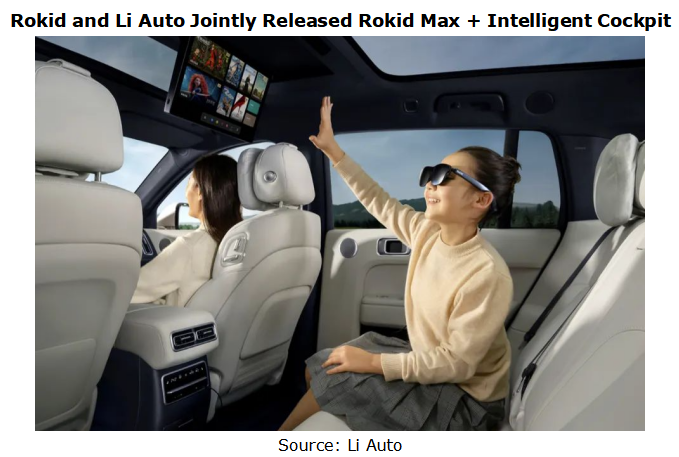
In November 2023, Xingji Meizu released MYVU intelligent AR glasses based on Flyme AR OS. The integration with Meizu smartphones via Flyme Link (a smartphone-IVI integration solution) not only allows for circulation of phone calls, music, videos, navigation, important application notifications and more to the AR glasses, but also makes it share computing power and network with the smartphone, thereby reducing the power consumption of the glasses and enabling a long cruising range. In the future, MYVU AR glasses will be integrated with cars and smartphones to create multi-terminal integration experience through seamless flow of applications and data.??
?
Therefore, at the “Meizu Flyme Ecosystem Launch”, Xingji Meizu upgraded the operating system Flyme to FlymeOS. Composed of Flyme 10 (smartphone OS), Flyme Auto (Meizu IVI system), and Flyme AR (AR glasses OS), FlymeOS covers three major areas: smartphone, XR and intelligent vehicle. FlymeOS features "Internet of Everything, Boundless and Infinite", and becomes the base for connecting all terminals.?????
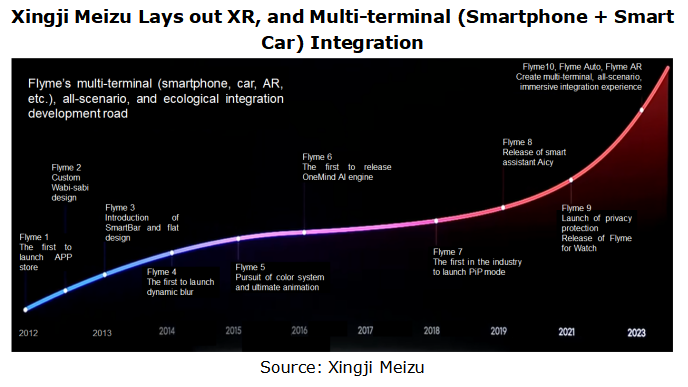
AI+AR to enhance voice interaction experience
?
At CES 2024, Rayneo unveiled Rayneo X2 Lite, a stereo full-color MicroLED optical waveguide AR glasses that introduce Rayneo AI (released in December 2023), a foundation model voice assistant. With Rayneo AI, Rayneo X2 Lite enables multiple capabilities including multi-round natural language conversations, trip planning, easy encyclopedic Q&A and brainstorming, and supports AI-assisted translation, 3D spatial navigation, and first-person perspective video creation. In March 2024, Rayneo Technology closed a new funding round and raised RMB100 million which will be used to develop and spawn next-generation AR glasses and expedite the construction of the AI+AR glasses ecosystem.????
Xingji Meizu is also laying out AI+AR. In November 2023, Xingji Meizu released two MYVU series AR glasses, connected to the Flyme AI foundation model. Based on AI, AI assistant can be awakened in real time to provide travel tips, study plans, business analysis, and other daily life and work collaboration. At the same time, AR glasses can realize scenario functions such as teleprompter, real-time translation (in Chinese and English), and cycling navigation.
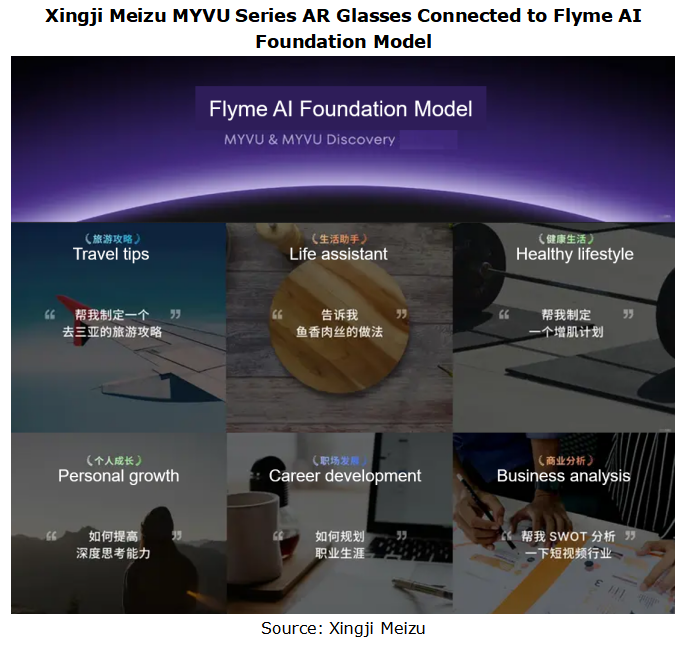
Automotive XR scenarios expand from entertainment to driving assistance and vehicle control.
Currently, XR mainly caters to users’ needs for cockpit entertainment, for example, viewing and gaming. Moreover suppliers are also exploring other application scenarios such as driving assistance and vehicle control.?
?
At CES 2024, BMW and XREAL together demonstrated XREAL Air 2 AR glasses, a device which integrates vehicle information, infotainment, vehicle electronic and electrical information, BMW cloud information and other data. Wearing the glasses, users can see how navigation instructions, hazard warnings, entertainment content, information on charging stations and supporting visualizations in parking situations are embedded perfectly into the real-world environment by the “XREAL Air 2”.???
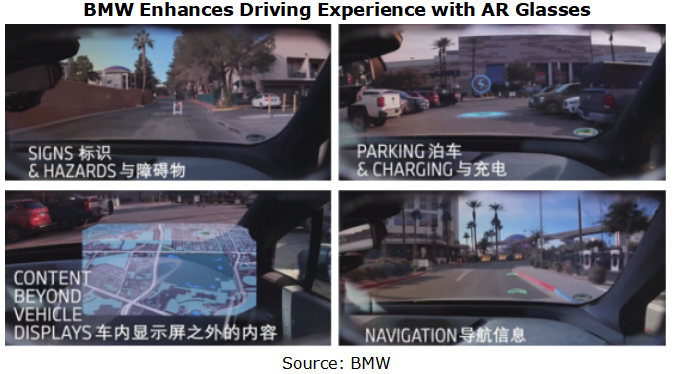
?
At CES 2023, Audi presented activesphere, a concept car which is equipped with four AR headsets. Wearing Magic Leap 2 AR glasses, the driver can view trip data, road conditions, location and navigation information in real time the MR visual interface with a 70° FOV; the passengers can control air conditioning temperature, airflow, and audio system next to their seats via gestures.??
?
Furthermore, AR technology can be available beyond the cockpit. In off-road scenarios, the topographic map can be projected into the surroundings; in commuting, traffic information, routes and safety warnings can be projected in layers into the driver's view.????
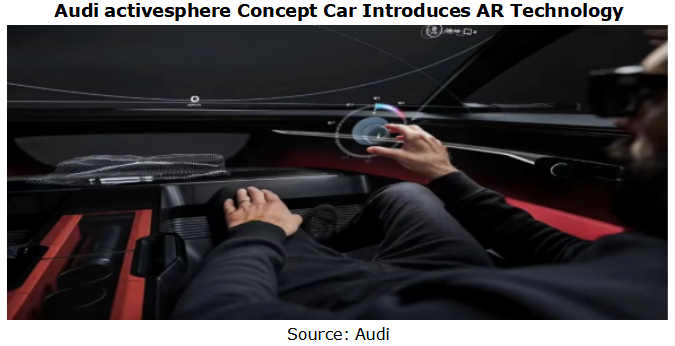 ?
?
?
Research Report on Overseas Cockpit Configuration and Supply Chain of Key Models, 2025
Overseas Cockpit Research: Tariffs stir up the global automotive market, and intelligent cockpits promote automobile exports
ResearchInChina has released the Research Report on Overseas Cockpit Co...
Automotive Display, Center Console and Cluster Industry Report, 2025
In addition to cockpit interaction, automotive display is another important carrier of the intelligent cockpit. In recent years, the intelligence level of cockpits has continued to improve, and automo...
Vehicle Functional Safety and Safety Of The Intended Functionality (SOTIF) Research Report, 2025
Functional safety research: under the "equal rights for intelligent driving", safety of the intended functionality (SOTIF) design is crucial
As Chinese new energy vehicle manufacturers propose "Equal...
Chinese OEMs’ AI-Defined Vehicle Strategy Research Report, 2025
AI-Defined Vehicle Report: How AI Reshapes Vehicle Intelligence?
Chinese OEMs’ AI-Defined Vehicle Strategy Research Report, 2025, released by ResearchInChina, studies, analyzes, and summarizes the c...
Automotive Digital Key (UWB, NearLink, and BLE 6.0) Industry Trend Report, 2025
Digital key research: which will dominate digital keys, growing UWB, emerging NearLink or promising Bluetooth 6.0?ResearchInChina has analyzed and predicted the digital key market, communication techn...
Integrated Battery (CTP, CTB, CTC, and CTV) and Battery Innovation Technology Report, 2025
Power battery research: 17 vehicle models use integrated batteries, and 34 battery innovation technologies are released
ResearchInChina released Integrated Battery (CTP, CTB, CTC, and CTV)and Battery...
AI/AR Glasses Industry Research Report, 2025
ResearchInChina released the " AI/AR Glasses Industry Research Report, 2025", which deeply explores the field of AI smart glasses, sorts out product R&D and ecological layout of leading domestic a...
Global and China Passenger Car T-Box Market Report 2025
T-Box Research: T-Box will achieve functional upgrades given the demand from CVIS and end-to-end autonomous driving
ResearchInChina released the "Global and China Passenger Car T-Box Market Report 20...
Automotive Microcontroller Unit (MCU) Industry Report, 2025
Research on automotive MCUs: the independent, controllable supply chain for automotive MCUs is rapidly maturing
Mid-to-high-end MCUs for intelligent vehicle control are a key focus of domestic produc...
Automotive LiDAR Industry Report, 2024-2025
In early 2025, BYD's "Eye of God" Intelligent Driving and Changan Automobile's Tianshu Intelligent Driving sparked a wave of mass intelligent driving, making the democratization of intelligent driving...
Software-Defined Vehicles in 2025: SOA and Middleware Industry Research Report
Research on automotive SOA and middleware: Development towards global SOA, cross-domain communication middleware, AI middleware, etc.
With the implementation of centrally integrated EEAs, OEM softwar...
Global and Chinese OEMs’ Modular and Common Technology Platform Research Report, 2025
Modular platforms and common technology platforms of OEMs are at the core of current technological innovation in automotive industry, aiming to enhance R&D efficiency, reduce costs, and accelerate...
Research Report on the Application of AI in Automotive Cockpits, 2025
Cockpit AI Application Research: From "Usable" to "User-Friendly," from "Deep Interaction" to "Self-Evolution"
From the early 2000s, when voice recognition and facial monitoring functions were first ...
Analysis on Li Auto’s Layout in Electrification, Connectivity, Intelligence and Sharing, 2024-2025
Mind GPT: The "super brain" of automotive AI Li Xiang regards Mind GPT as the core of Li Auto’s AI strategy. As of January 2025, Mind GPT had undergone multip...
Automotive High-precision Positioning Research Report, 2025
High-precision positioning research: IMU develops towards "domain controller integration" and "software/hardware integrated service integration"
According to ResearchInChina, in 2024, the penetration...
China Passenger Car Digital Chassis Research Report, 2025
Digital chassis research: Local OEMs accelerate chassis digitization and AI
1. What is the “digital chassis”?
Previously, we mostly talked about concepts such as traditional chassis, ch...
Automotive Micromotor and Motion Mechanism Industry Report, 2025
Automotive Micromotor and Motion Mechanism Research: More automotive micromotors and motion mechanisms are used in a single vehicle, especially in cockpits, autonomous driving and other scenarios.
Au...
Research Report on AI Foundation Models and Their Applications in Automotive Field, 2024-2025
Research on AI foundation models and automotive applications: reasoning, cost reduction, and explainability
Reasoning capabilities drive up the performance of foundation models.
Since the second ha...